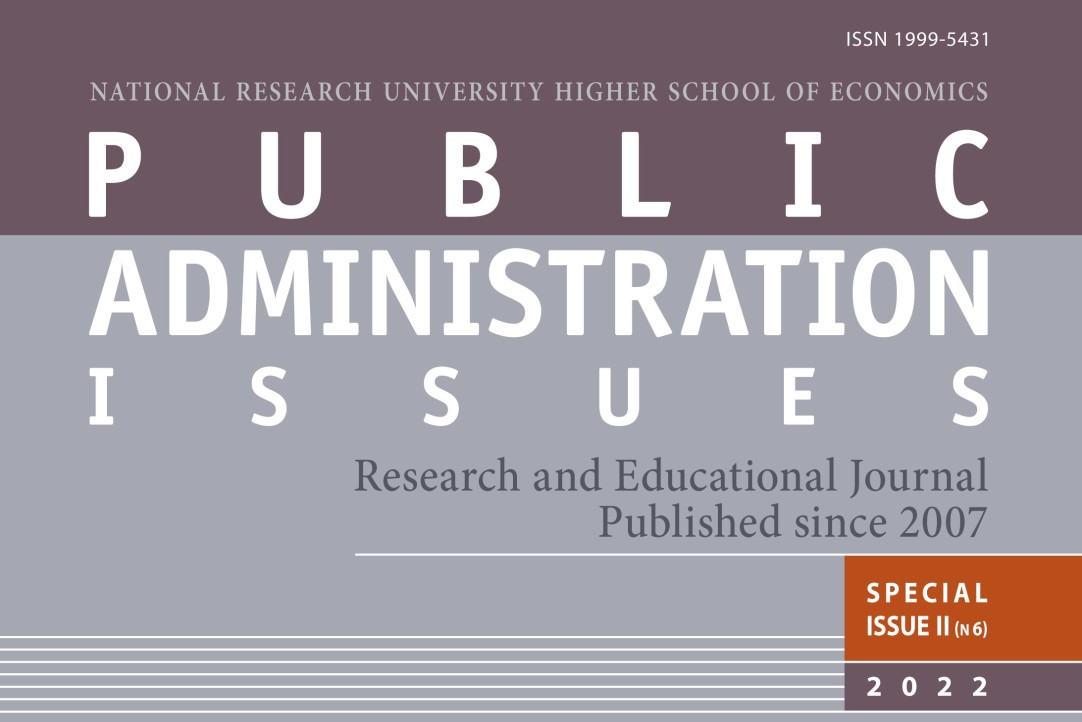Special issues of the journal “Public Administration Issues”

Special issues of the journal “Public Administration Issues” traditionally include articles prepared by researchers from different countries and regions. Nevertheless, there is a steady trend of representation: first of all, the journal is attractive to researchers from Asia, Central and Eastern Europe, South America and Africa. The presence of authors from the BRICS countries in the issues of the journal is increasing, which indicates the established international affi liation of the journal. The journal is interesting because it highlights current problems of public administration in these vast regions, problems that often remain on the periphery of the leading Anglo-Saxon journals, or are considered by them from the standpoint of established governance practices in North America and Western Europe.
The articles published in this special issue are divided into four blocks, which present the most popular topics that enjoy the attention of the authors.
The first block is devoted to public governance during the Covid-19 period. The problems of governance in the era of Covid-19 for developing countries have focused on a dilemma: to protect the population from the spread of the pandemic as much as possible with the help of restriction and control measures, or to support the national economy through measures to stimulate production and purchasing activity, avoiding restrictions. The article presented to the readers examines how this dilemma is solved in Vietnam. It is considered which strategies of using the tools of the healthcare system, bearing in mind the balancing between the goals of epidemiological protection of the population and support of the economy, are used in Vietnam. The example of Vietnam is important, I believe, for many countries with limited management resources.
Secondly, recently the importance of HR management in public organizations has been increasing. Thus, the second block of the issue is devoted to this. In the modern conditions of instability of the international and country development, emerging turbulence of international relations, the quality of personnel and flexibility in decision-making is becoming a key element of success of organizations. In this issue of the journal, several articles are devoted to different aspects of this topic. In the first article of the block, using the example of Turkey, it is shown how the style of implementation of the development strategy, the quality of the organization’s activities, depends on its organizational structure. This is followed by a review article by an author from India devoted to the analysis of the literature on regulatory culture and regulatory identity in their connection with organizational culture and organizational identity. This article is placed in the HR management block because it is adjacent to the article on organizational culture. In the third article of the block, the topic of the personnel of public organizations is continued by Slovak researchers who, based on empirical data, have established a positive relationship between the involvement of civil servants in the work of agencies and support from agency managers. At the same time, as it has turned out, there are gender differences in engagement with the same level of support. Finally, in the last article of the block devoted to the topic of HR management, the problem of the applicability of the standard (Norm Staff ) approach to calculating the number and qualifications of personnel required for the performance of job duties based on the specified functions of public organizations is investigated. It is shown that this approach to planning human resources is insufficient in the face of uncertainty and variability of the conditions for the functioning of public organizations.
The third block of the issue contains articles on the interaction of the state and business. The first article presents the experience of Lahore Province (Pakistan) in ensuring the sustainable development of urban municipal corporations in the context of achieving Sustainable Development Goals (SDG). The authors focus on the study of the institutional complexity of eff ective HR practices. Thus, this article is located at the intersection of the topics of personnel management in public administration and the topics of interaction between the state and business. An article from Uzbekistan, the country, which is successfully developing international economic cooperation, discussing the experience of the positive impact of administrative decentralization and granting additional powers to municipal administrations to attract direct international investment. The block ends with an article from Brazil, which proposes a model of qualitative assessment of public services using internal indicators of service provision. This model has been tested with the help of a voluminous empirical study of Brazilian federal public services conducted in cooperation with the Brazilian Ministry of Economy, and surely it can be applied in other developing countries.
Describing the current topic of public administration in the regions of Asia, Central and Eastern Europe, South America and Africa, it should be noted that there is continuing interest of researchers in electronic management technologies and their dissemination in developing countries. These technologies cover the population unevenly, the attitude of citizens to electronic administrative technologies varies from active acceptance to complete denial. The article from Indonesia examines the attitude of young people to online electronic filling of tax returns and shows that despite the predisposition of the millennial generation to use new technologies, there are risks that prevent this age group from adopting the technology of online filling of tax returns. Th us, there is a problem that, in general, for developing countries, can be defined as risks of using electronic management technologies in relation to specifi c conditions of developing countries.
Concluding the preface to this Special Issue, I would like to emphasize that for huge regions around the Globe, new approaches and directions of public administration, ideas and empirical data are beginning to emerge, which enrich analytics and may in the future lead to signifi cant changes in traditional views on public administration.
